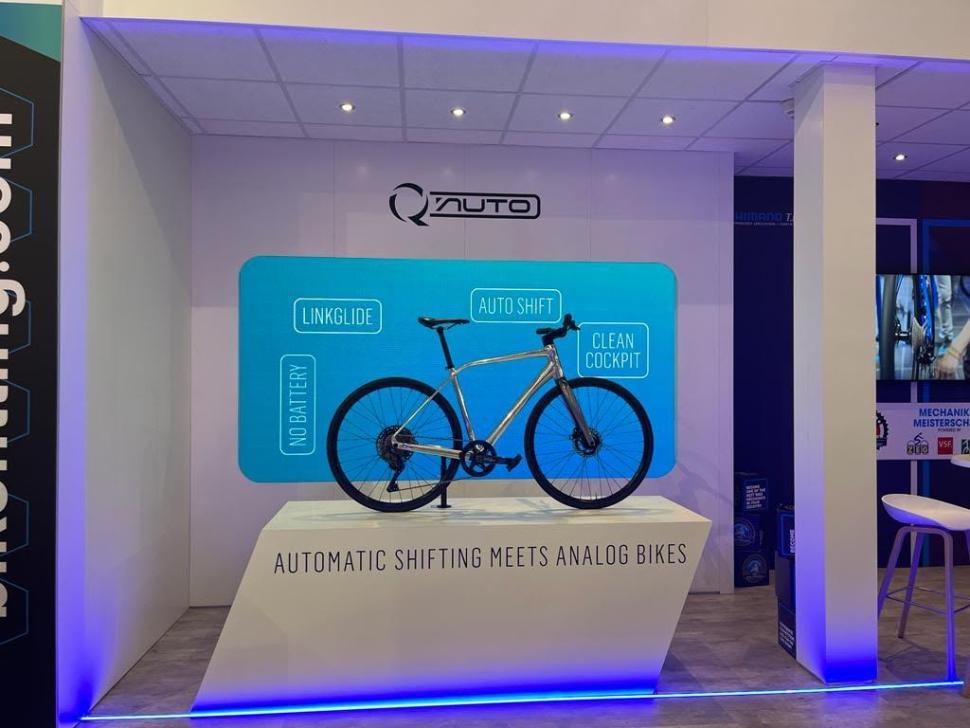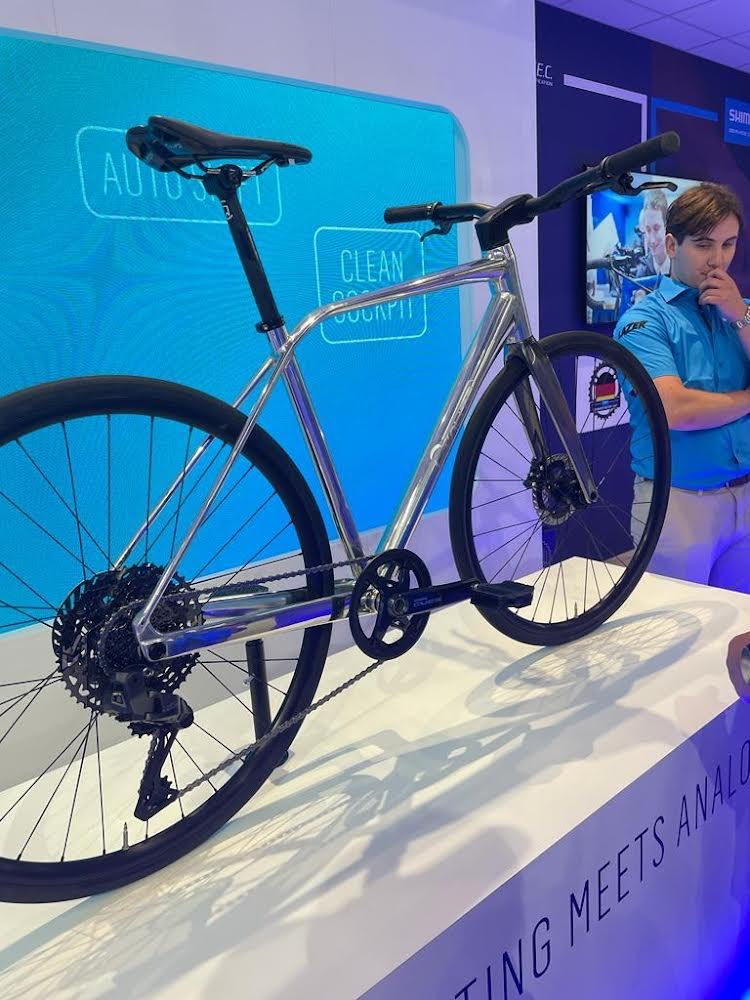- News
- Reviews
- Bikes
- Components
- Bar tape & grips
- Bottom brackets
- Brake & gear cables
- Brake & STI levers
- Brake pads & spares
- Brakes
- Cassettes & freewheels
- Chains
- Chainsets & chainrings
- Derailleurs - front
- Derailleurs - rear
- Forks
- Gear levers & shifters
- Groupsets
- Handlebars & extensions
- Headsets
- Hubs
- Inner tubes
- Pedals
- Quick releases & skewers
- Saddles
- Seatposts
- Stems
- Wheels
- Tyres
- Tubeless valves
- Accessories
- Accessories - misc
- Computer mounts
- Bags
- Bar ends
- Bike bags & cases
- Bottle cages
- Bottles
- Cameras
- Car racks
- Child seats
- Computers
- Glasses
- GPS units
- Helmets
- Lights - front
- Lights - rear
- Lights - sets
- Locks
- Mirrors
- Mudguards
- Racks
- Pumps & CO2 inflators
- Puncture kits
- Reflectives
- Smart watches
- Stands and racks
- Trailers
- Clothing
- Health, fitness and nutrition
- Tools and workshop
- Miscellaneous
- Buyers Guides
- Features
- Forum
- Recommends
- Podcast
TECH NEWS
 Shimano Q'Auto concept with Cues 1
Shimano Q'Auto concept with Cues 1Shimano's Q'Auto automatic shifting technology touted to launch in 2025, as cycling components giant admits it "can't break Bosch's hold on e-bikes"
Shimano's plan to introduce automatic shifting appears to be progressing, with reports out of Japan suggesting the technology could be launched as soon as next year.
The concept was first aired to the public at Eurobike last year, the components giant turning heads with its stand displaying the Q'Auto automatic shifting alongside its newly announced cross-compatible CUES groupsets which will consolidate Claris, Sora and Tiagra under one name.
At the time, we were only told that the unreleased Q'Auto concept was in development and there was no official timeline for its release, although it now appears that a date may be edging closer with Nikkei Asia reporting it is "expected to hit the market as soon as 2025", something that we have since confirmed with Shimano.
In short, automatic shifting means the bike decides when to change gear, not the rider, a technology that has already been seen in some of Shimano's e-mountain bikes that feature Auto Shift, and the company has previously disclosed an example of an auto shifting control in a US patent dating way back to the year 2000.
As our man on the ground Tom Weijand noted when the Q'Auto concept was debuted at Eurobike last year, there's a capacitor in the rear hub that stores a little bit of power derived from the wheel's rotation, and automatically shifts gears for you. This is assisted by an inclinometer that works out if you're going uphill or downhill and can adjust shifting parameters to keep cadences higher or lower as required.
"The magic of this is about bringing battery-less power to a mechanical shifting ecosystem," he concluded.
At the time, Shimano was clear there was not a definitive plan for where it was going to go, even if tiny capacitors and batteryless-powered shifts were enough to get us quite excited. We contacted Shimano for confirmation of the touted launch date and were told the reports are correct and that while the brand wishes to remain tight-lipped on exactly when, we can expect to see it on bikes at some point next year.
However, the reports coming out of Japan suggest that the Q'Auto system, which uses a shifting mechanism, an 11-speed cassette and a wheel hub containing a chip, will likely hit the market in 2025.
The reports also stress the artificial intelligence angle to the tech, as Q'Auto is to be loaded with riding patterns memorised from test ride data and able to customise activity around a rider's habits, learning from speeds and inclines to select the correct gear.
According to Nikkei Asia, Shimano will be supplying Q'Auto bundles with pedals and brakes to western and Taiwanese bike manufacturers soon, the date reported as "2025" and a hint that the tech is expected to be fitted on bikes priced "at just under 200,000 yen (£1,035)" in a bid to make them a competitor to the e-bike market.
In a somewhat surprising admission, Shimano's Deputy President Takashi Toyoshima said: "We can't break Bosch's hold on e-bikes.
"In terms of having a lightweight feel and being easy to ride, Q'Auto bikes stand a chance."
So, will the possibility of more user-friendly gearing to get you up hills thanks to Q'Auto be a more enticing prospect than getting up them quicker with a (likely more expensive) motor-assisted bike? This remains to be seen of course, but we'll be enquiring about getting a Q'Auto-equipped bike in to try as soon as they become available.
Dan is the road.cc news editor and joined in 2020 having previously written about nearly every other sport under the sun for the Express, and the weird and wonderful world of non-league football for The Non-League Paper. Dan has been at road.cc for four years and mainly writes news and tech articles as well as the occasional feature. He has hopefully kept you entertained on the live blog too.
Never fast enough to take things on the bike too seriously, when he's not working you'll find him exploring the south of England by two wheels at a leisurely weekend pace, or enjoying his favourite Scottish roads when visiting family. Sometimes he'll even load up the bags and ride up the whole way, he's a bit strange like that.
Latest Comments
- ktache 14 sec ago
Multiple police vehicle involved in crash https://www.theguardian.com/uk-news/2025/apr/09/five-people-in-hospital-... TPAC gone awry?
- jaymack 11 min 55 sec ago
If this MP were better acquainted with his constituency than he is with the US President's colon he may have some insight as to the needs of the...
- mdavidford 24 min 3 sec ago
Begging denied. It's nonsense.
- momove 43 min 24 sec ago
Sounds like a good reason not to have built it for motor traffic then.
- OnYerBike 2 hours 8 min ago
As far as I can tell, the only story that raised suspicions of a new Bolt was CyclingNews' article, which was published last week - hardly "ages"...
- Rendel Harris 2 hours 29 min ago
Cancel culture is, as I understand it, denying a person a platform, employment et cetera solely on the grounds of their political views or cultural...
- hawkinspeter 3 hours 9 min ago
None shall be weary nor stumble among them; none shall slumber nor sleep; neither shall the girdle of their loins be loosed, nor the latchet of...
- Rendel Harris 5 hours 28 min ago
That wouldn't be new, more than twenty years ago my insurers tried to avoid paying out on the theft of my motorcycle on the grounds that I couldn't...
- hawkinspeter 21 hours 26 min ago
PKD foresaw it, though his novel was based on a different outcome of WWII, not the precursor to WWIII. Maybe the Idiocracy film is a closer fit?


Add new comment
39 comments
Shimano gear hubs do not like to be shifted under load and that is kind of inevitable If the bike decides when to shift (think of changing gradients uphill).
Shimano made an automated, electric shifting gear hub 25 years ago, called Auto-D. which used their 4 speed hub; it worked great, with seamless fast shifts and a choice between auto or manual shifting.. I bought a Giant bike fitted with the system and still have it, still works perfect; it uses the same battery used in camera's, so not proprietary battery tech..
https://www.commuterbicycles.com/hub.htm
Well here's a solution in search of a problem
and zero AI involved... talk about click-bait
It seems to be very common at the moment for the media to incorrectly use the term "artificial intelligence" when in actual fact they just mean "technology"
Well it's entirely possible it's using some fuzzy logic to calculate the shift points, which is a form of AI. Has been around for many years in people's washing machines etc. Many branches of AI and generative AI like in ChatGPT is just one branch.
Why? I'm perfectly capable of changing gear myself and don't need any help to do so.
It might be useful for novice riders but if they use this system they won't ever learn to use gears.
I think there is an "issue" in that it is common to see riders in big-big with very crossed chains butr this system doesn't (yet?) fix that problem as it is a 1x set-up.
What might make sense is for head units to tell riders when they might consider changing gears/chainrings, but this will only work with electronic shifting and presumably people who have electronic shifting will generally know when to change gear so not sure there is even a market for this feature.
Yeah, like those automatic cars. They'll never catch on.
Pages